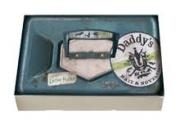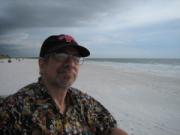
Daddy's
By Lindsay Hunter
Featherproof Books
The twenty-four prose compositions here range from three brief paragraphs to twelve pages, most told by women who have boyfriends or husbands prominent in whatever goes on, as well as the eponymous “Daddy.” Fathers occur in almost all, as the title portends, and family relations are fulcrums, but in the end, it is the narrators’ personalities that keep us interested.
The characters range in age from child to adult; they seem to be rooted in lower- and lower-middle-class milieus, which Hunter renders convincingly, and I find myself drawn in. Further, sex is a prominent aspect in almost every one. Maybe it’s my own extended adolescent maleness that is the root of my interest, and the fact that I’ve read few descriptions of sex from the female point of view, like these, but Hunter does a convincing job persuading us of the authenticity of the sex she describes. Though not anatomically specific, many of the stories have a clarity of scene and action that persuades us.
In “That Baby,” for instance, the narrator takes up with her father: “One night Daddy turned to me and we began our special time. I let Daddy do what he would since it had been so long, but soon I noticed Levis standing in the doorway watching . . . and when I made Daddy stop, Levis climbed into bed between us and began to try feeding, something he hadn’t done in months, falling asleep with my breast in his mouth.”
The scene is odd, if not downright creepy, as a friend commented, but the very oddness is delivered as if what happens is normal, which partly accounts for the interest.
As in most fiction, it is the voice that convinces us of the writer’s authority in its rendering of particulars, and Hunter has learned her craft: “The dark out there was a navy quilt sewn with pearl buttons,” she writes in “Out There.” “There was part of a moon wedged in the sky that gave off a dull glow. The dogs started around then, yelping and whining and getting closer and closer. I brought my knees up to my chest and concentrated on my shoes because I could see them, they were a fact, they were indisputable, I remembered putting them on in the morning.”
As in “That Baby,” there is a genuine strangeness in some of the worlds Hunter has made, whose unpredictability adds a compelling touch. In “Food Luck,” for instance, we learn about the narrator’s strange family in comments to her brother: “You remember that time we entered that contest and I ate 37 pies and you got to 38 and launched a barf wave over the crowd. You remember then as a joke I got down on my hands and knees and ate it up, even made slurpy slurp slurp slurp noises for maximum joke effect.” This is the opening; the story goes on to tell of the mother’s enormous size and the father’s abandonment of his family.
In “That Baby,” an oversized, quasi-grown child is abandoned by his mother, who has just been moved by pride at his physical dominance of another child. In “Out There,” the father burns up the family car in the desert. Throughout the collection, description of such oddities are direct, simple and clear. All the narrators, in fact, seem ordinary enough to make us believe their stories, but the details they reveal are just odd enough to keep us shaking our heads.


